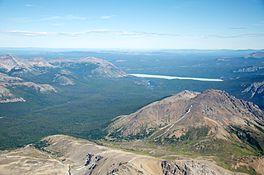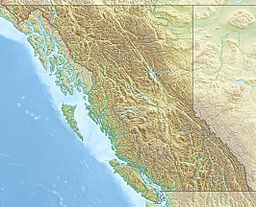Taseko Lakes facts for kids
Quick facts for kids Taseko Lakes |
|
|---|---|
 |
|
| Location | British Columbia |
| Coordinates | 51°15′33″N 123°35′26″W / 51.25917°N 123.59056°W |
| Primary inflows | Taseko River, Lord River, Tchaikazan River |
| Primary outflows | Taseko River |
| Basin countries | Canada |
| Max. length | 25 km (16 mi) |
| Max. width | 1.8 km (1.1 mi) |
| Surface area | 17.56 km2 (6.78 sq mi) |
| Average depth | 43.3 m (142 ft) |
| Max. depth | 110.6 m (363 ft) |
| Water volume | 1.35 km3 (0.32 cu mi) |
| Surface elevation | 1,323 m (4,341 ft) |
| Islands | None |
| Settlements | None |
The Taseko Lakes are two beautiful lakes in the middle of British Columbia, Canada. They are called Upper Taseko Lake and Lower Taseko Lake. These lakes are actually wider parts of the upper Taseko River. You can find them in an area known as the southern Chilcotin District.
The name "Taseko" comes from the Tsilhqotʼin language, which is spoken by the local Indigenous people. In their language, the lakes are called Dasiqox Biny. "Desiqox" means "Mosquito River". This is also where the English name for the river comes from. Originally, both lakes were thought of as one, even in English, until 1954 when they were officially named as two separate lakes.
A short, narrow section of water called the Taseko Narrows connects the two lakes. In the Tsilhqotʼin language, this narrow part is called nanats'akash. It's a very important place for deer to cross the water. Several rivers flow into the Taseko Lakes. The Tchaikazan River flows in from the southwest, between the upper and lower lakes. The Taseko River itself feeds the lakes from the southeast. The large Lord River also joins the lakes from the south.
Exploring Taseko Lakes and the Park
The Taseko Lakes are now a special part of Tsʼilʔos Provincial Park. This park is a protected area where nature can thrive. It also includes Chilko Lake and the land between the two lakes.
Inside the park, you'll find places like the Nemaiah Valley and Yohetta Valley. These are wide, U-shaped valleys that connect the lake areas. They were carved out by glaciers long ago. The park helps protect the amazing wildlife and beautiful landscapes of this region.
 | James Van Der Zee |
 | Alma Thomas |
 | Ellis Wilson |
 | Margaret Taylor-Burroughs |


